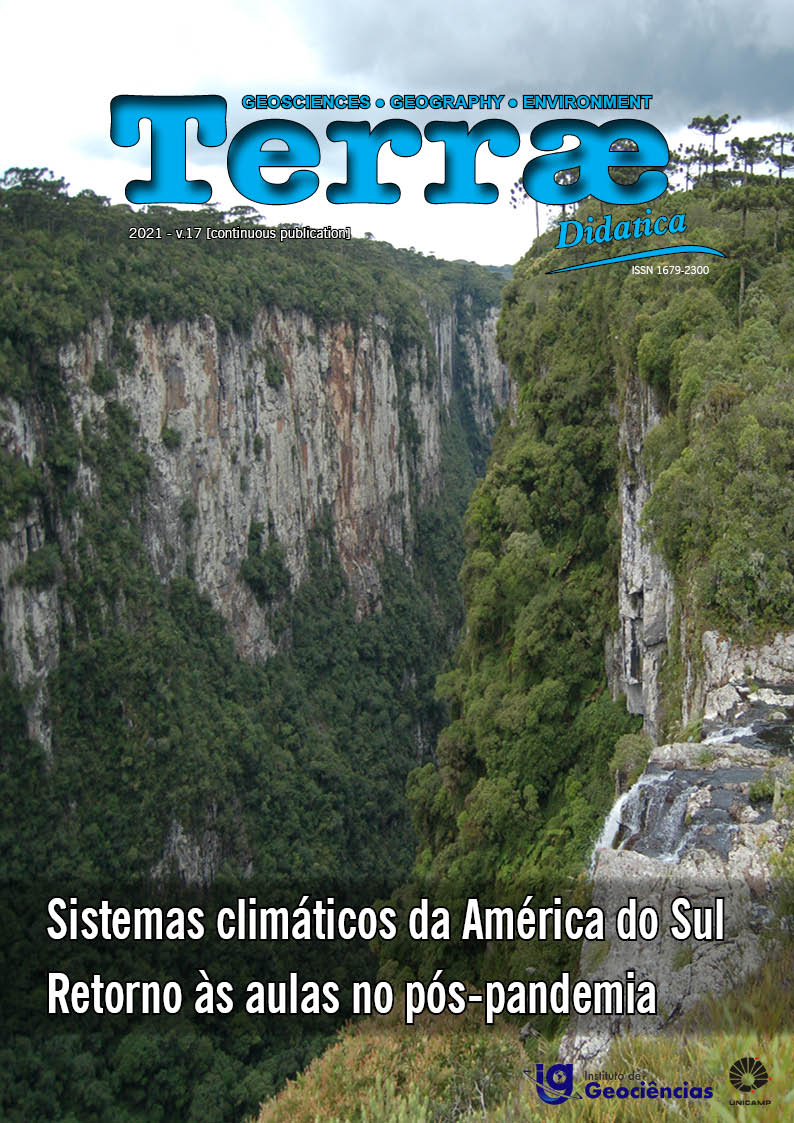Resumo
O desenvolvimento sustentável abrange um aglomerado de problemas ambientais, sociais e económicos, sendo urgente ensinar para a cidadania responsável e informada. A visão holística do Sistema Terra na educação em ciências potencializa a perceção do papel do Homem nos ecossistemas e promove a consciência ambiental imprescindível ao desenvolvimento sustentável. Este trabalho é um recurso didático para discussão e reflexão orientada no ensino das Ciências Naturais (8.º ano do 3.º ciclo do Ensino Básico) e da Biologia e Geologia (10.º ano do Ensino Secundário), segundo o currículo português. A abordagem inovadora do Sistema Terra afasta-se da tradicional perspetiva centrada em uma interpretação redutora do planeta. Propõem-se questões e atividades, sequenciais e intencionais, adequadas ao domínio Sustentabilidade na Terra e ao capítulo I “A Terra e os seus subsistemas em interação” e capítulo III “A Terra, um planeta único a proteger”, definidos, respetivamente, no currículo nacional do 8.º e do 10.º ano de escolaridade.
Referências
Abrunhosa, M., Chambel, A., Peppoloni, S., & Chaminé, H. I. (2021). Advances in Geoethics and Groundwater Management: Theory and Practice for a Sustainable Development. In: Abrunhosa, M., Chambel, A., Peppoloni, S., & Chaminé, H. I. (Eds). (2021). Proceedings of the 1st Congress on Geoethics and Groundwater Management. Springer. p. 1-523. doi: 10.1007/978-3-030-59320-9.
Assaraf, O. B., & Orion, N. (2005). Development of system thinking skills in the context of Earth System Education. Journal of Research in Science Teaching, 42(5), 518-560. doi: 10.1002/tea.20061.
Barzagli, F., & Mani, F. (2019). The increased anthropogenic gas emissions in the atmosphere and the rising of the Earth’s temperature: are there actions to mitigate the global warming? Substantia, 3(1), 101-111. doi: 10.13128/Substantia-69.
Branco, E. A., Roquetti, D. R., & Moretto, E. M. (2017). O sistema terrestre (land system) como plataforma de integração e interpretação das complexas relações ambiente-sociedade. Sustentabilidade em Debate, 8(3), 111-125. doi: 10.18472/SustDeb.v8n3.2017.24518.
Batzri, O., Assaraf, O. B. Z., Cohen, C., & Orion, N. (2015). Understanding the Earth Systems: Expressions of Dynamic and Cyclic Thinking Among University Students. Journal of Science Education and Technology, 24(6), 761-775. doi: 10.1007/s10956-015-9562-8.
Dias, A. J. G., Freitas, M. C. A. O., Guedes, F., & Bastos, M. C. (2014). Geosfera. Rev. Ciência Elem., 2(1), 107. doi: 10.24927/rce2014.107.
Ellis, C. E. (2015). Ecology in an anthropogenic biosphere. Ecological Monographs, 85(3), 287-331. doi: 10.1890/14-2274.1.
European Space Agency (ESA). (2006). The Changing Earth: New Scientific Challenges for ESA`s Living Planet Programe. European Space Agency, ESA.
Frontier, S. (2001). Os Ecossistemas. Lisboa. Instituto Piaget.
Goodison, B., Brown, J., Jezek, K., Key, J., Prowse, T., Snorrason, A., & Worby, T. (2007). Presente y futuro de la criosfera polar, incluyendo la variabilidad del ciclo hidrológico ártico. Boletín de la OMM, 56(4), 284-292.
Hoffman, M., & Barstow, D. (2007). Revolutionizing Earth System Science Education for the 21st Century. Report and Recommendations from a 50-State Analysis of Earth Science Education Standards. Cambridge. TERC, Center for Earth and Space Science Education.
Intergovernmental Panel on Climate Change (IPCC). (2019). Summary for Policymakers. In: IPCC Special Report on the Ocean and Cryosphere in a Changing Climate [Potner, H. O., Roberts, D. C., Masson-Delmotte, V., Zhai, P., Tignor, M., Poloczanska, E., Mintenbeck, K., Nicolai, M., Okem, A., Petzold, J., Rama, B., & Weyer, N. (Eds.)]. (no prelo).
Latorre, M. L., Júnior, O. A. D. C, Carvalho, A. P. F. D., & Shimabukuro, Y. E. (2002). Correção atmosférica: conceitos e fundamentos. Espaç. Geogr., 5(1), 153-178.
Lévêque, C. (2002). Ecologia: do Ecossistema à Biosfera. Instituto Piaget. Lisboa.
Monteiro, A. F. M., Yamamoto, A. L. C., Silva, P. N., & Reboita, M. S. (2021). Conhecer a complexidade do sistema climático para entender as mudanças climáticas. Terræ Didatica, 17, 1-12. doi: 10.20396/td.vl7i00.8663763.
Moreira, C. (2015). Biosfera. Rev. Ciência Elem., 3(2),113. doi: 10.24927/rce2015.113.
Oliveira, M. J. C., Barbosa, R., Carneiro C. D. R., & Nobre, H. M. (2021). Comunicação pública da Ciência diante das coalizões em conflito sobre aquecimento global. Terræ Didatica, 17, 1-13. doi: 10.20396/td.v17i0.8663967.
Orion, N. (2007). A Holistic Approach for Science Education For All. Eurasia Journal of Mathematics, Science & Technology Education, 3(2), 99-106. doi: 10.12973/ejmste/75382.
Orion, N. (2019). The future challenge of Earth science education research. Disciplinary and Interdisciplinary Science Education Research,1(3), 1-8. doi: 10.1186/s43031-019-0003-z.
Ribeiro, T., Cardoso, A., Silva, J., Lima, D., & Vasconcelos, C. (2021). Chamadas de Geoética: Um Módulo Interativo para Comunicar Geociências. In: Abrunhosa, M., Chambel, A., Peppoloni, S., & Chaminé, H. I. (Eds.). (2021). Advances in Geoethics and Groundwater Management: Theory and Practice for a Sustainable Development. Springer. p. 363-366.
Silveira, L. M. da, & Petrini, M. (2018). Desenvolvimento Sustentável e Responsabilidade Social Corporativa: uma análise bibliométrica da produção científica internacional. Gestão & Produção, 25(1), 56-67. doi: 10.1590/0104-530x3173-16
Sterling, S. (2010). Living in the Earth: Towards an Education for Our Tim. Journal of Education for Sustainable Development, 4 (2), 213-218. doi: 10.1177/097340821000400208.
Stroeve, J. C., Kattsov, V., Barrett, A., Serreze, M., Pavlova, T., Holland, M. & Meier, W. N. (2012). Trends in Arctic sea ice extent from CMIP5, CMIP3 and observations. Geophysical Research Letters, 39 (16). doi: 10.1029/2012gl052676.
Summons, R. E. (1993). Biogeochemical cycles. In: Engel, M. H., & Macko, S. A. (Eds.), Organic Geochemistry (pp. 3-21). Springer.
Tundisi, J. G. (2003). Ciclo hidrológico e gerenciamento integrado. Cien. Cult., 55 (4), 31-33.
UNenvironmentprograme (2020). Coronavirus outbreak highlights need to address threats to ecosystems and wildlife. United Nations. UNEP. URL: https://www.unep.org/news-and-stories/story/coronavirus-outbreak-highlights-need-address-threats-ecosystems-and-wildlife Acesso 3.03.2021
United Nations. (1987). Report of the Word Commission on Environnment and Development: Our Common Future. United Nations.
Vasconcelos, C., & Orion, N. (2021). The Earth sciences education as a key component of the education for sustainability. Sustainability, 13(3), 1316. doi: 10.3390/su13031316.
Wohlleben, P. A. (2019). Sabedoria Secreta da Natureza. Lisboa. Ed. Pergaminho.

Este trabalho está licenciado sob uma licença Creative Commons Attribution-NonCommercial 4.0 International License.
Copyright (c) 2021 Terrae Didatica


